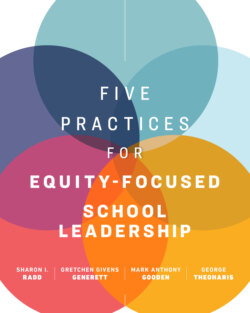Читать книгу Five Practices for Equity-Focused School Leadership - Sharon I. Radd - Страница 23
На сайте Литреса книга снята с продажи.
"These kids don't want to learn."
ОглавлениеOver and over, we hear this phrase or variations when well-intentioned and hard-working educators become frustrated with a lack of academic progress. Most often, this story is used to talk about groups of students who are Black, Latino/a/x, or Indigenous, students coming from low-income families, students with disabilities, some groups of immigrant students, and students who are learning English. Seldom (if ever) do we hear this story targeted at middle or upper middle-class White students, even when these students struggle. In some ways, the meaning behind this story is that "these students" cannot learn—they are somehow deficient. In part, holding tight to this story is a way of saying "the problem is not my fault; I have done all I can" in the face of these challenges. This story frees educators from responsibility while it simultaneously marginalizes students.
At Green Tree School, just over 50 percent of the students were students of color, 60 percent of the students qualified for free and reduced lunch, and 16 percent of the students were learning English (spanning 12 home languages other than English). With an increasingly diverse student body and a steady decline in student outcomes, Green Tree was sanctioned by federal/state accountability requirements and put on the state list of "failing schools." Over and over in different contexts, staff would say things like, "These kids just don't want to learn."
Over a three-year period, the new principal strategically supported the staff to employ myriad school improvement strategies: balanced literacy; hands-on, standards-based, investigative mathematics; hands-on science; a change to collaborative and inclusive services for students with disabilities and ELs; a schoolwide priority of classroom community building; focused outreach to the community and parents; ongoing discussions and learning about race; and a commitment to democratic and shared leadership between the principal and the teachers.
Janie, a seasoned, dedicated teacher, expressed her stress and exhaustion about the changes and the needs of her students. She worked incredibly hard with her team and deeply cared for her students—evidenced by decades of Green Tree families of all races, incomes, and abilities who loved her. However, she also regularly said, "Those students just can't learn" about specific students—all of whom were Black, low-income, or with a disability—when progress was slow or imperceptible.
One of Janie's students was an upper-middle class White boy who struggled significantly with literacy and behavior. Janie never said he couldn't learn and always found the patience and ideas to try something new with him. Yet, she was outspoken to the principal that "There is no way we are going to improve on the reading tests (state andlocal). Too many of my students can't do it. What we're asking them to do is too hard for them."
Janie was a dedicated, talented, and well-respected veteran teacher; AND she also held deep and problematic beliefs that some of her students could not and would not learn. We highlight this tension—not to blame Janie but to illustrate how good and talented educators can do noble work and hold deficit views at the same time.
The school's relentless and multifaceted improvement efforts resulted in significant changes in student outcomes. In looking over the achievement results of her students from the year that Green Tree got off the state "failing schools" list, Janie shared, "I really did not think so many of them would pass the test [pointing to the names of students of color, students with disabilities, and low-income students]." And with a huge sigh of relief and a smile, she continued, "I was wrong when I said they couldn't do it. They did it." Janie's students provided an essential lesson for her about who "can't learn."
We caution you against wanting students to rise above low expectations while you simultaneously cast them in a light of incompetence. We offer you Green Tree's story, and specifically its multifaceted improvement effort, as an important reminder that educators are wrong to say, believe, and act as though some students "can't learn" or "won't learn." Recognize this as a deficit view, and acknowledge the complex contradiction in being a good person and holding such views.
